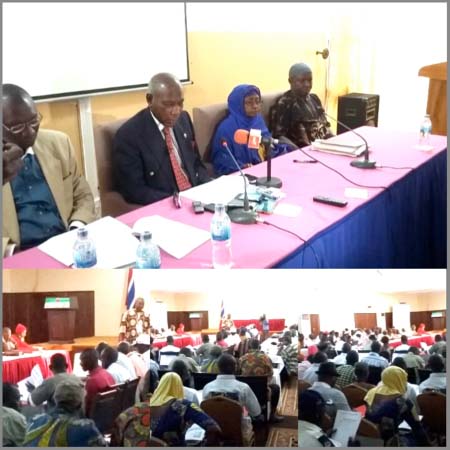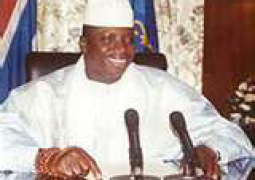
The
Independent Electoral Commission (IEC) Saturday commenced a two-day national
Training of Trainers (TOT) to better equip key personnel for the upcoming
December 1 presidential election.
The
training exercise held at Paradise Suites Hotel targeted commission members,
heads and representatives of political parties and senior officers of the
Gambia Police Force.
The
IEC Commissioner, Isatou Jallow-Ndure, said election is very important in any
democratic society and, like any other major activity; it has its guidelines
including a number of processes, operations and procedures.
The
main objective of the training exercise was to put the participants through the
processes and procedures of the election.
The
Chairman of IEC, Alieu Momarr Njai, said the coming days and weeks are very
important milestones in the political landscape of The Gambia as the nation
envisages and assiduously approaches the presidential election.
He
called on the entire population of the country to come out to vote, and to
participate in the electoral processes, while strictly adhering to the
electoral code.
He
said the electoral process begins long before polling day, as it involves an
intricate network of delicate exercises, requiring astute adherence to
legislation and rules.
A
process, he added, is made even more challenging and sometimes overwhelming
with added demands from political stakeholders.
The
IEC chairman pointed out that a good and successful election does not happen
without careful preparation, and planning of huge and costly events entailing
the completion of myriad of tasks and sub-tasks involving large numbers of
people, all of whom should be aware of their responsibilities in the electoral
process and accountable under the law for their actions.
“They
usually include an election law that is fully tuned to provide free and fair
elections; an election commission which is truly autonomous and fearless;
administrative procedures that ensure even the smallest man and woman can
exercise their franchise freely and without fear; and an electorate which is
fully aware of its rights and responsibilities,”hestated.
Mr
Njai said that since the essence of elections is that they be seen to be”free
and fair” by all parties involved, it is essential that all activities
preceding and leading up to polling day be properly administered.
He
further said that the dimensions of free and fair elections evoke a number of
considerations which include the ethical basis in the conduct of the election.
Accessibility
of the electorate to voting areas, equity of the vote where all votes and all
voters are treated equally, security of polling operations, transparency of
actions and decisions, professionalism of voting personnel, accountability,
secrecy of the vote, the process witnessed by party agents, domestic (local)
and international observers and the distribution of the register, both soft and
hard copies, with a total of 886,578 voters with 1,422 polling stations.
He
said the training course would fully equip the participants with the requisite
knowledge and skills to perfectly conduct a free, fair and transparent
election.
He
enjoined the participants to take the training with all needed seriousness
because it is their roles as election personnel that determine the crucial
outcome.
He
expressed the commission’s profound gratitude and appreciation to the UNDP for
the support through the Election Project, and the government of The Gambia for
fully-funding the supplementary voter registration where 89,649 voters were
registered.
He
also thanked other stakeholders in the electoral process, especially the
political parties, the security agents, the media, the observers, the
electorate, the commissioners and staff of the commission for their dedication
and hard work.
The
assistant returning officer of IEC for West Coast Region and one of the
participants, Daniel Gomez, said the TOT programme would better equip him and
his colleague to learn new methods and skills as to how to carry out a peaceful
and conducive atmosphere for the election.
He
advised his colleague trainees to be more attentive and steadfast in the
training programme, so that they would be able to apply the basics on the
ground when they set out in their various disciplines.



